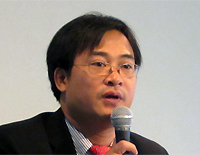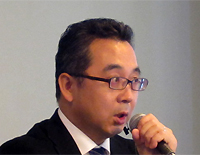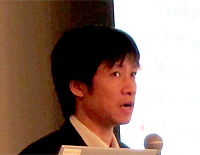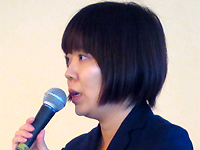"Meeting Standards, Winning Markets” – Opportunities and Challenges to East Asian Agri-food Trade towards Regional and Global Markets.
September 19, 2013 (Thursday)
Japan External Trade Organization (JETRO), 5th Floor, Ark Mori Building
>>Event Guide/Program
IDE-JETRO, UNIDO
Session 1 | Session 2
Session 2: Panel session on “Standards Compliance as Business Opportunity”
Moderator:
Kaoru Nabeshima, Researcher, IDE-JETRO
Panelists:
Nguyen Hoai Nam, Deputy General Secretary, Vietnam Association of Seafood Exporters and Producers
Hiroki Tsukahara, Coordinator, Manager, Quality Management Department, AEON Co., Ltd.
Vu Hoang Nam, Lecturer of Economics, Manager of International Affairs, Foreign Trade University
Nanae Yamada , Researcher, IDE-JETRO
“Vietnam Seafood Export: Opportunities & Challenges”
Nguyen Hoai Nam
Deputy General Secretary, Vietnam Association of Seafood Exporters and Producers
The Vietnam Association of Seafood Exporters and Producers (VASEP) provides supports for firms to export seafood products. For Vietnam, fisheries and seafood industry is an important industry, accounting for 5–6% of the gross domestic products (GDP). The export value of the industry is large and ranks 5th most important export commodities after garment products, electronics, crude oil, and shoes. As of 2013, there are 567 seafood processing plants in Vietnam, all meeting national standards of hygiene including HACCP. In 2000, only 17 plants were qualified for exporting to the EU. However, the number of such plants has increased substantially to 415. This reflects the steady efforts for compliance with the regulations and standards of the export counterparts. Japan is an important market, accounting for 17.9% of Vietnam’s seafood export value in 2012. Shrimp accounts for 60% of seafood exports to Japan. Vietnamese seafood processors are facing many challenges recently. For example, in May 2012, Ethoxyquin (an antioxidant) was detected in shrimps imported from Vietnam and this has resulted in more frequent monitoring of shrimp imported from Vietnam. It has been difficult to meet the regulations in the Japanese market, and shrimp exports to Japan are decreasing. Vietnamese seafood processors also need to promote vertical integration in response to the increased traceability requirements from customers. In addition to compliance with food safety regulations, the seafood processors need to shoulder environmental and social responsibilities. Customer requirements for quality, the environment, and society are reflected in many private standards, such as GlobalGAP and BRC, and seafood processors need to obtain certifications of the private standards for their business transactions. Meanwhile, private standards are increasing in complexity and type, increasing the costs of obtaining such certifications.
Handouts (2.2MB)

Nguyen Hoai Nam
Deputy General Secretary,
Vietnam Association of
Seafood Exporters and Producers
“Food Safety Capacity Building Programmes in Emerging Markets: Malaysian Model”
Hiroki Tsukahara
Coordinator, Manager, Quality Management Department, AEON Co., Ltd.
In a public-private partnership with UNIDO, AEON is engaging in a capacity-building project for supplier development in Malaysia, aimed at small and medium enterprises (SMEs). In this project with UNIDO, stakeholders cooperate with each other and expect this will lead to positive outcomes. From this project, the Malaysian government expects the development of domestic industries and inclusions of Malaysian firms into global food supply chains, as well as creation of job opportunities. UNIDO can assist in establishing sustainable industrial infrastructures, improve Malaysia’s trade capacity, and achieve public-private partnership. For AEON, this project can support our efforts to cater Asian markets, can promote Global Food Safety Initiative (GFSI) with AEON being the main facilitator in Asia, and provide safe foods to consumers in Asia. Through participating in this project, Malaysian suppliers can expand their opportunities to enter the industry and start exporting their products. This project is divided into three phases: pilot phase, roll-out phase, and a final phase establishing capacity-building platform. The expected number of suppliers involved in each phase is 25, 100, and eventually all suppliers, respectively. Currently, the pilot phase is underway and what came out from this phase is the realization that there is a large gap in the capacities of suppliers in Malaysia. Technical challenges include: lack of documentations regarding food safety information, the non-implementation of the food safety systems, improper premise layouts and process flow not complying with basic foods safety level requirements, and insufficient knowledge and experience of food science and food safety among key personnel. Improvements in these challenges are needed for the development of suppliers who can comply with the global standards.
Handouts (1.1MB)

Hiroki Tsukahara
Coordinator, Manager,
Quality Management Department,
AEON Co., Ltd.
“Trade Standards Challenges in the Shrimps and Pangasius Value Chains: Extracts from Asian TSC Report”
Vu Hoang Nam
Lecturer of Economics, Manager of International Affairs, Foreign Trade University
Overcoming challenges at each stage of supply chains is necessary for Vietnamese shrimps to meet the standards required in the global market. In the supply chain involving shrimp farmers, the farming of fingerling shrimps and adult fish are susceptible to water pollution and diseases resulting from farming ponds with high stocking density. This can lead to improper uses of chemicals and veterinary drugs to prevent diseases. Industry organizations provide information on permissible chemicals, but farmers are not aware of what they are using and how to use them properly. Collectors who purchase shrimps from various farmers conduct only visual inspections. Moreover, they often mix shrimps from different sources in the collection process. Processors conduct inspections at inspection agencies after purchasing shrimps from collectors, but they use a random sampling inspection and cannot detect all violations. Shrimp farming also faces significant scale limitations because shrimps are susceptible to disease. There is no choice but to depend on small-scale farmers to minimize the outbreak of disease, causing a major problem for traceability management for collectors as well. Therefore, it is important to establish credible inspection agencies for shrimp farmers. In addition, providing information, technical, and institutional support will be necessary. In pangasius farming, in contrast, many processors are increasing the scale. Based on the scale of farming areas, the share of large-scale farming is increasing. Small-scale farmers tend to downsize their businesses or exit from the market. The introduction of numerous private standards is also burdensome for processors. I would also like to point out the importance of harmonization among private standards.
Handouts (1.5MB)

Vu Hoang Nam
Lecturer of Economics,
Manager of International Affairs,
Foreign Trade University
“Port Rejections of Agricultural and Food Products Exports from East Asia: Issues and Future Challenges”
Nanae Yamada , Researcher, IDE-JETRO
We examined frozen vegetables as case study subjects to analyze their efforts in ensuring safety and quality control in supply chains. Fresh and frozen vegetables are China’s main agricultural products for exports. Major destinations are Japan, the EU, and other developed countries as well as the ASEAN countries and South Korea, to which exports are increasing recently. Of the Japanese rejections of imported vegetables and fruits, Chinese products are decreasing in share but still account for approximately 30% of the total violations because of a large volume of exports (in 2010). Chinese agricultural and food products have raised significant food safety problems in the domestic and overseas markets. After the detections of residual pesticide in frozen spinach imported into Japan in 2002, the Japanese and Chinese governments discussed the case, which resulted in the establishment of a system for a safety control of agricultural products for export in China. The solutions adopted by the Chinese government include the following. Firstly, a registration system was introduced. In this system, exports were permitted only from certified farms and processors. Second, the government increased and strengthened inspections throughout the production process, encouraging firms to adopt quality control through adopting HACCP as well as controlling key inputs such as pesticide and fertilizer by contract farms, and to conduct voluntary sample testing before harvesting raw material vegetables by firms. Sample testing before shipping is conducted by the China Inspection & Quarantine Services (CIQ) and by various firms at the time of export. Thirdly, distribution channels for agricultural products for export are completely separated from those for domestic markets. Agricultural products are exported directly from registered large-scale farmers via export processors. In contrast, agricultural products for domestic markets, which represent a large part of such products, are produced by small-scale farmers and distributed through diverse and complex distribution channels, making it difficult to ensure the traceability of these products. Fourth, the Chinese government has supported a vertically integrated agricultural system and the diffusion of contract farming by assisting leading firms, in order to improve the safety of agricultural and food products for domestic markets. The government is also working to improve the domestic distribution system for agricultural products. The development of a clean farm land market and the distribution control of risky pesticides and other production inputs will also become important in the future.
Handouts (162KB)

Nanae Yamada
Researcher, IDE-JETRO
The results of the recent joint study between UNIDO and IDE-JETRO are expected to provide key information to governments in developing countries, aid agencies, and firms involved in agricultural and food product trade. In addition, to contribute to the discussions on support for developing countries and international trade policies, the results are being disseminated through various opportunities outside of this international symposium. These were presented at a workshop held in Hanoi, Vietnam in March 2013, at the 8th South-South GATE Convention in Shanghai in May 2013, and at WTO Aid for Trade in Geneva in June 2013, and will be presented at a side event of the WTO Ministerial Conference to be held in Bali in December 2013.
Session 1 | Session 2

